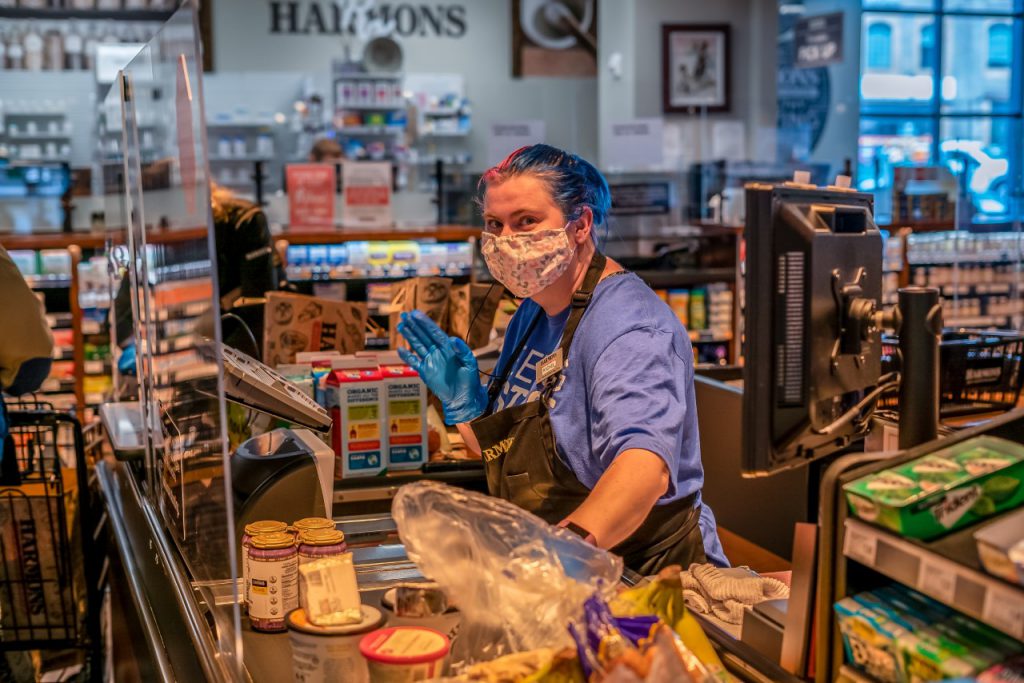
From Apocalyptic to Responsible Shopping

by Liz Dobbins (’21)
It was mid-March. Spring break was ending, classes were moving online, I had no groceries and only one roll of toilet paper left. That’s when I heard about the panic: people were rushing to grocery stores to stock up on canned goods, cleaning supplies, and, apparently, toilet paper. I, like everyone else, fed off that panic. Realizing that paper towels would only last as a substitute for so long, I hit the stores in hope of finding one package of toilet paper. I remember entering the store and seeing herds of families with multiple carts packed so full it looked like a scene straight out of Extreme Couponing. The shelves in the baking, canned goods, meat, and cleaning aisles were decimated. I left that store with a single package of ramen noodles, a bag of frozen chicken, and no toilet paper. Going online to order groceries was another lost cause—the dates for delivery were filled for the foreseeable future.
It’s now June and I have since scored a Costco-sized package of toilet paper and had no problem buying a whole case of ramen noodles. States have begun to open back up and the grocery frenzy has died down. That short-lived period and the innovations and rules that were implemented by stores because of it has left me questioning the dynamics behind this essential business. How has online grocery shopping evolved since this started? How do stores help prevent the spread of coronavirus? And, now that my toilet paper concerns are over, when can I expect sanitizing wipes to be restocked?

I turned to Westminster alumnus and 22-year, IT grocery employee Jason Farley (MBATC ’09) for some answers. For the last four years of his two-decade career, Jason has been working as a business analyst for Harmons, a Utah-based grocery store. “One of the first things I was working on when I started was establishing e-commerce for Harmons,” Jason says. “It’s gotten to the point that, if e-commerce was considered a store in the cloud, it’s just as profitable as some of our physical stores.”
Jason helped lead the launch of Harmons’s e-commerce platform roughly three years ago, but it has never been tested as thoroughly as it was in March. “Once COVID hit, the number of customers using the platform jumped hundreds of percent in no time flat,” he says. “One of the issues with the platform was there weren’t limitations of how much of one thing you could order.” Hence, the great toilet paper shortage of 2020.
Not only was this issue seen on the e-commerce platform, but it also occurred in stores. As inventory became restocked, limits were put on the items that customers had been rushing to buy. The problem didn’t lie with the supply chain—it was with the panic. Even today, with those limits, items are quick to sell out. Jason notes the solution to ensuring products stay on the shelves is being a responsible shopper. Buy only what you need in the moment, not what you think you’ll need for an apocalypse. “People have odd behaviors about that,” he says. “When they see it they equate it to ‘I struck gold. I need to buy it.’”
Being a responsible shopper also means being conscious of the rules set out by the CDC: maintain social distance, wear a mask in public, and stay home if you are sick. “The last thing we want is having to close grocery stores—this could be in any chain, this could be a Smith’s store, a Fresh Market store, a Harmons store—but we need to be responsible for the employees and the facilities,” Jason says. “It’s an essential place you need to go and the last thing we want is for them to be closed down because they need to be deep-cleaned.”
Not only does Harmons hold their customers responsible, but the organization has also held themselves responsible for stopping the spread of the coronavirus. Large plexiglass dividers, hand sanitizer at checkouts, stickers marking where to stand in line, one-direction aisles, cart sanitization, one-door entrances, and temperature checking employees before their shifts are things that have all been implemented in every Harmons—and in many other grocery chains. “Harmons is very responsible,” Jason says. “We need the community to be responsible within a grocery store as well. These are essential employees who are there to help you, but we can only give you what you need if you help us.”
After speaking with Jason, I began to realize that the new normal is here. Wearing a mask, following aisle traffic rules, and standing on a designated sticker while in line has become a part of the grocery shopping experience. Panic and buying out all the toilet paper should not be the new normal.
At the end of our discussion, I was still worried about getting items—like sanitizing wipes—that I rely on to help fight the coronavirus. As I told Jason my fears he chuckled slightly and remarked, “Just get there early. When we stock overnight, get there the next morning. If there are things you think you can’t get, try the e-commerce platform. Just put an order in for those few things that you have a hard time getting. You can just drive up, we will put it in your trunk, and off you go—or you can have it delivered.”
About the Westminster Review
The Westminster Review is Westminster University’s bi-annual alumni magazine that is distributed to alumni and community members. Each issue aims to keep alumni updated on campus current events and highlights the accomplishments of current students, professors, and Westminster alum.
GET THE REVIEW IN PRINT STAY IN TOUCH SUBMIT YOUR STORY IDEA READ MORE WESTMINSTER STORIES